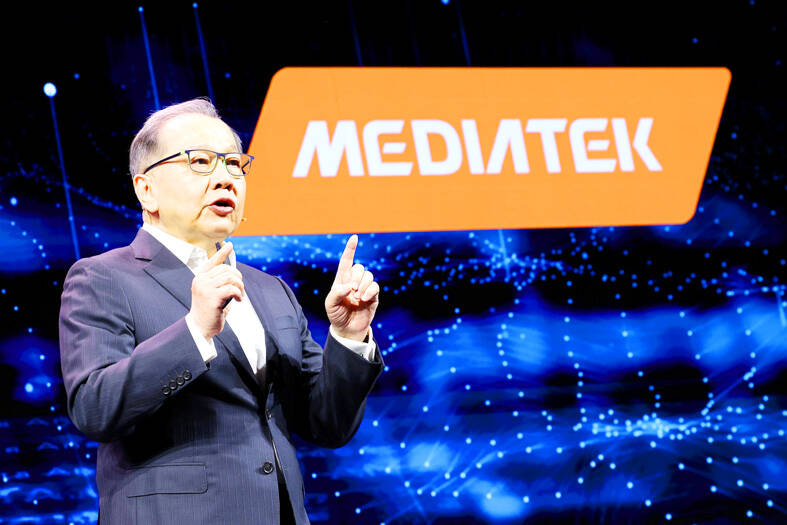Chip designer MediaTek Inc (聯發科) yesterday said revenue this quarter would contract by 4 percent sequentially in the worst-case scenario on softer smartphone demand.
Revenue is expected to be between NT$147.2 billion and NT$159.4 billion (US$4.6 billion-US$4.98 billion), compared with NT$153.31 billion last quarter, the company said.
MediaTek said demand for smartphone chips would be flat or slide sequentially this quarter, while demand for smart devices and power chips would go up. Mobile phone chips made up 56 percent of the company’s total revenue last quarter.

Photo: RITCHIE B. TONGO, EPA-EFE
Gross margin of 46 to 49 percent is forecast for this quarter, compared with 48.1 percent last quarter, the company said.
“Despite the market uncertainties, there are no material order changes from customers, partly due to the long production cycle time,” MediaTek chief executive officer Rick Tsai (蔡力行) said at an online earnings conference.
MediaTek did not provide full-year growth projections, citing the potential impact from US tariff and trade policies.
“We are certainly watching very closely the potential impact on other markets, such as China, Japan, [South] Korea, etc. That’s why we said, as many other CEOs have also, that we remain quite cautious about the second half of the year. The risks for us ... [are that] we rely more on consumer electronics, such as TVs or some of the home devices,” Tsai said.
Still, the company is not overly pessimistic, he said, adding that tariffs would have limited impact on its business due to its low exposure to the US market, which accounted for 10 percent of its total revenue.
For the mid to long-term, the trend toward ubiquitous artificial intelligence (AI) remains intact and its growth prospects remain solid, the company said.
MediaTek yesterday kept unchanged its goal of generating more than US$1 billion in revenue from supplying AI application-specific integrated circuit (ASIC) chips next year.
The company unveiled its cooperation with Nvidia Corp over the AI ASIC development at the US firm’s annual GTC conference earlier this year.
“Yes, we did have a good discussion and engagement with our partner, Nvidia. The work is in its early stage... I would prefer to defer further discussion to another time,” Tsai said.
For enterprise ASIC, MediaTek has high confidence about its capabilities to design customized AI accelerators based on its key technologies and intellectual properties, Tsai said.
The company said it has secured several “design-ins” and “design-wins” for the new ASIC business.
During the first quarter of this year, MediaTek saw net profit decline 7 percent to NT$29.33 billion from NT$31.54 billion a year earlier. On a quarterly basis, net profit surged 23.3 percent from NT$23.79 billion.
Earnings per share dropped to NT$18.43 from NT$19.85 a year ago, but rose from NT$14.95 a quarter earlier.
Gross margin fell to 48.1 percent, compared with 52.4 percent one year earlier and 48.5 percent the prior quarter.

NEW IDENTITY: Known for its software, India has expanded into hardware, with its semiconductor industry growing from US$38bn in 2023 to US$45bn to US$50bn India on Saturday inaugurated its first semiconductor assembly and test facility, a milestone in the government’s push to reduce dependence on foreign chipmakers and stake a claim in a sector dominated by China. Indian Prime Minister Narendra Modi opened US firm Micron Technology Inc’s semiconductor assembly, test and packaging unit in his home state of Gujarat, hailing the “dawn of a new era” for India’s technology ambitions. “When young Indians look back in the future, they will see this decade as the turning point in our tech future,” Modi told the event, which was broadcast on his YouTube channel. The plant would convert

‘SEISMIC SHIFT’: The researcher forecast there would be about 1.1 billion mobile shipments this year, down from 1.26 billion the prior year and erasing years of gains The global smartphone market is expected to contract 12.9 percent this year due to the unprecedented memorychip shortage, marking “a crisis like no other,” researcher International Data Corp (IDC) said. The new forecast, a dramatic revision down from earlier estimates, gives the latest accounting of the ongoing memory crunch that is affecting every corner of the electronics industry. The demand for advanced memory to power artificial intelligence (AI) tasks has drained global supply until well into next year and jeopardizes the business model of many smartphone makers. IDC forecast about 1.1 billion mobile shipments this year, down from 1.26 billion the prior

People stand in a Pokemon store in Tokyo on Thursday. One of the world highest-grossing franchises is celebrated its 30th anniversary yesterday.

Zimbabwe’s ban on raw lithium exports is forcing Chinese miners to rethink their strategy, speeding up plans to process the metal locally instead of shipping it to China’s vast rechargeable battery industry. The country is Africa’s largest lithium producer and has one of the world’s largest reserves, according to the US Geological Survey (USGS). Zimbabwe already banned the export of lithium ore in 2022 and last year announced it would halt exports of lithium concentrates from January next year. However, on Wednesday it imposed the ban with immediate effect, leaving unclear what the lithium mining sector would do in the